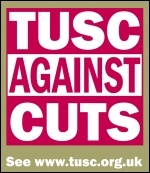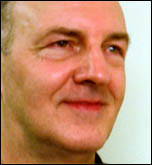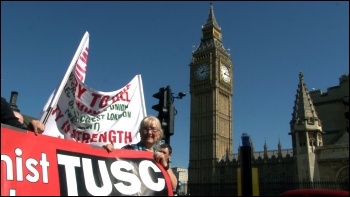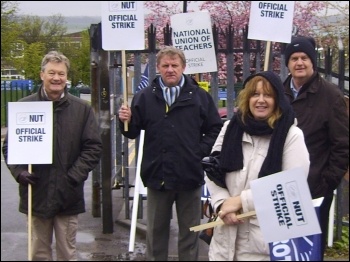Dave Nellist, Trade Unionist and Socialist Coalition chair, speaks to the Socialist

November was an unusual month. You can wait a long time for a byelection and then six come along in one month.

TUSC Against Cuts
The Trade Unionist and Socialist Coaltion (TUSC) contested three of the parliamentary byelections, getting 220 votes (1.3%) in Manchester Central, 277 (1.6%) in Middlesbrough and 281 (1.3%) in Rotherham. 1,412 (1.6%) votes were also obtained in the Bristol mayoral election, in which TUSC received some local media coverage.
Where there are many byelection candidates, with little serious media coverage for TUSC, and, as in Manchester, historic low turnouts, then TUSC votes at this stage are certainly not large enough to be challenging for seats. But that is not the only reason we are standing in elections.
A petition, even of tens of thousands of signatures, doesn’t automatically lead to a government body or a council changing its mind.
Its real value is that it represents tens of thousands of conversations with people on why that issue was important.
In the same way, during the November election campaigns, thousands of conversations were held with people who, even if they didn’t vote TUSC at this stage, at least now know that we exist and are trying to build an anti-austerity, anti-cuts electoral platform for working people
Respect
Respect did not materialise as a serious alternative, getting a lower vote than TUSC in Manchester, albeit with a higher vote than TUSC in Rotherham.
I was asked during November why TUSC and Respect were competing against each other. I made the point that we have written, over the summer, to Respect, but unfortunately were unable to get a reply to have a proper dialogue.
In any event, TUSC and Respect are not the same. TUSC aims to create a new independent voice rooted in the organisations and communities of the working class.
Respect has had breakthroughs, but only in certain selective areas, and does not pursue the work in the trade unions that TUSC does.
Building TUSC
The job is still to discuss with union and anti-austerity activists, the importance of building a genuine, independent political voice for people faced with three parties singing the same tune, albeit in slightly different keys.
TUSC’s steering committee will be meeting mid-December to discuss the broader issues arising out of the November elections.
A TUSC trade union forum will be held in the New Year, at which the work done so far in discussing with activists in the RMT transport union, PCS civil service union, the Fire Brigades Union, the Prison Officers Association, the National Union of Teachers, the University and College Union and other unions not affiliated to Labour, can develop.
We will also continue to work with activists in Labour-affiliated unions such as Unite and Unison who are trying to break the link.

TUSC is looking to stand 400 candidates in the council elections of May 2013, which should enable it to get more serious media coverage, in particular from the BBC.
Ukip protest vote
The United Kingdom Independence Party (Ukip) saw an increase in its share of the votes as a layer saw it as a means to protest against the three main parties.
Millionaire-backed Ukip can sound different to the Lib-Lab-Con-sensus but in truth it shares the same central aim: make the working and middle classes pay for capitalism’s crisis.
Ukip was part of a small pro-cuts rally in May 2011. Its website states “the coalition’s cuts do not scratch the surface of Labour’s deficit” and calls for reduced tax for big business and the rich.
Ukip’s leader, Nigel Farage, puts on a Boris-esque, likable buffoon character to attract voters and mask the anti-working class, pro-big business and xenophobic policies of his organisation.
To the establishment, while problematic, Ukip is nonetheless a more palatable, right-populist, protest vote to the fascist-led British National Party.
For sure, they would also rather promote Ukip than the real, anti-cuts, socialist alternative that TUSC offers.
That is why in the past four years Farage has made 12 appearances on the BBC’s Question Time, only second to Lib Dem business secretary Vince Cable.
In the May local elections, the BBC headlined “growing support” for Ukip. This followed an average vote – in the seats it contested – of 13%, compared to 6.2% for TUSC. In the Liverpool Mayoral election, TUSC got over twice Ukip’s vote.
Voters are increasingly rejecting the establishment parties. But if a credible, anti-cuts alternative is not built, right wing groups such as Ukip can be undeserved beneficiaries of people’s anger.
TUSC
The Trade Unionist and Socialist Coalition (TUSC) is an electoral alliance that stands candidates against all cuts and privatisation.
It involves the RMT transport workers’ union, leading members of other trade unions including the PCS, NUT and POA, the Socialist Party and the Socialist Workers Party.
Read the latest TUSC bulletin at www.tusc.org.uk
Ballot box reports
Rotherham
Alistair Tice, Rotherham TUSC election agent
After the TV cameras and chauffeured-in politicians had left the Rotherham byelection count, TUSC campaigners were out the next day alongside Unison members opposing NHS cuts.
TUSC’s Ralph Dyson became known as the candidate against the £50 million hospital cuts, with over 3,000 petition signatures collected in the three week election campaign.
Wherever TUSC went – the town centre, bus station, hospital, council offices, mosques, schools, estates – we received a friendly response and seemed to be everyone’s second preference. But, under first past the post, that doesn’t get many votes!
281 voted for TUSC – 1.3% – about what we expected, but only 170 votes behind the Lib Dems.
Before the election, the far-right targeted the town with two demonstrations, supposedly protesting against the alleged “Asian grooming cover-up”, but in reality trying to sow racism and division.
Labour’s electoral machine excluded a local Asian councillor and imposed an external candidate, leading to over half the selection meeting delegates walking out.
At the count, Labour members were mightily relieved to keep the seat they’ve held for 80 years. While their majority almost halved due to the low turnout, their vote share increased slightly to 46%.
Disgust with the resigned MP Denis MacShane’s expenses fraud did not break traditional Labour loyalties, especially among older voters with an undying class hatred of the Conservatives.
With eleven candidates, protest votes were divided among many parties.
Ukip received its highest parliamentary vote – 21% – after cynically exploiting the removal of East European foster children from Ukip-member foster parents to gain huge publicity and sympathy.
While handled clumsily, it has emerged there were multiple reasons – not merely the foster parents’ political affiliation – for why the children were removed.
Also, the placement was always intended to be temporary, with the aim of placing the children with carers who could speak their first language.
The racist British National Party came third with 1,804 votes – 8%, down from 10% in May 2010.
Yvonne Ridley, the former Express journalist and Taliban-hostage who converted to Islam, came fourth with 1,778 votes.
Despite Respect nationally not responding to TUSC, locally their new supporters in Rotherham, especially Asian women and youth, are very open to joint campaigning with TUSC against the cuts and against the far-right.
The English Defence League candidate, masquerading as an independent, got 29 votes and was beaten by spoilt ballot papers!
The real winner though was “fed up of all of them” with two-thirds not voting. This shows the opportunity for TUSC to build an electoral alternative, rooted in the trade unions, which can appeal to all working-class communities, especially those most exploited and disenfranchised under the corrupt capitalist system.
Middlesborough
Alan Docherty, Teesside Socialist Party

John Malcolm
John Malcolm, TUSC candidate and Socialist Party member, polled 277 votes in the Middlesbrough byelection on 29 November.
This was the first time that TUSC stood in Middlesbrough. People on the streets were supportive of our anti-cuts and pro-public service message. As a candidate, John was known by trade union activists and health workers.
Labour expected to win this, one of their safest seats, with little effort. Their candidate promised to have a constituency office and hold regular surgeries.
This was to counter criticism that Stuart Bell, the deceased MP, refused to hold surgeries and spent a lot of time in France.
Labour also promised a ‘jobs fair’. But there aren’t many vacant jobs here!
Labour gained 60% of the vote. UKIP came second, but with only 1,990 votes, not far ahead of the Lib Dems and Tories, both decimated compared to previous elections as a punishment for their austerity policies.
The maverick Peace Party candidate, with a lot of money spent on its campaign, gained over 1,000 votes with sizeable support from the Asian community.
The BNP vote was slashed from 2,000 to just over 300. This was despite the BNP getting media coverage that was denied to TUSC.
Labour claimed after the election they had the overwhelming support of the people of Middlesbrough. The reality was a 25% turnout; 3 out of 4 people did not vote! Just 15% voted Labour; and if Labour does not seriously oppose austerity their vote will decline even further.








